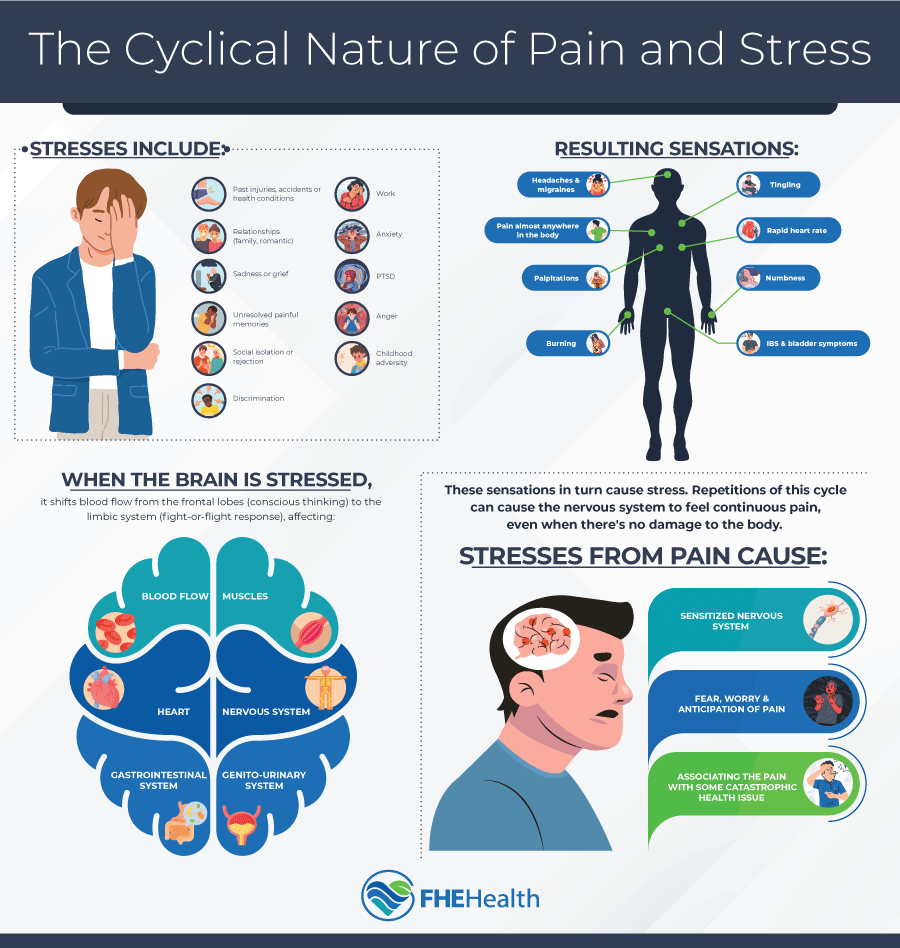
Roughly 51 million adults in the U.S. experience some form of chronic pain, making it one of the main reasons that people seek medical care. You can develop chronic pain for many reasons, including chronic conditions like arthritis, immune disorders like lupus, past injuries, or even some other disease. It’s quite common for chronic pain to not have a clear source.
Because the pain can be so powerful, chronic pain management is the key to leading an active, fulfilling life. While it may not be possible to fully return to a quality of life similar to before the pain began, proper management can make life far easier. However, trying to control chronic pain is difficult.
Here, we’ll dive into what chronic pain is and what causes it, as well as the healthiest ways you can manage it.

Understanding Chronic Pain: A Complex Medical Condition
Chronic pain is a complex issue that medical scientists have been attempting to fully understand for many years. Pain itself is probably the most common symptom of the widest variety of conditions. From a small paper cut to cramps to cancer, so many different problems all cause pain.
When you experience a wound or some other problem, your nerves send signals to the brain that then get translated into the sensations we know as pain. Why this happens isn’t exactly clear, but medical researchers believe it may play a role in a reflexive process that helps keep us safe. If something hurts, we stay away from it and avoid it in the future, allowing us to survive individually and as a species.
Chronic pain is pain that persists far longer than the typical recovery period, or that develops as a result of a chronic disease. Sometimes, the pain can turn “on” or “off.” But for many people, the pain is continuous and often unbearable. It can affect your ability to work, eat, or perform any other task that other individuals can do easily. Chronic pain can disrupt your life.
The problem is that chronic pain has many potential causes, some of which are obscure or still unknown. Plus, your genetics, medical history, and many other factors play a role. All of this means that chronic pain is hard to understand and difficult to treat.
Common Causes of Chronic Pain: Unraveling the Mystery
So, what are all the various causes of chronic pain? A few ailments stand out as particularly common culprits. We already mentioned that issues like arthritis or cancer trigger chronic pain because they are ongoing conditions.
Beyond these, chronic pain often begins with an injury, such as a pulled muscle, broken bone, or infection. However, the pain continues to persist long after the actual injury heals, and the individual may even become more sensitive to pain.
Additionally, some pain doesn’t appear to have a clear physical cause. Experts refer to this as psychosomatic or psychogenic pain.
Sometimes, these different forms of pain overlap, becoming even more complicated and debilitating.
Identifying the Underlying Factors: What’s Behind Your Chronic Pain?
Chronic pain management, whether you are attempting it yourself or with the aid of a professional, begins with understanding the “why.” Why do these conditions cause chronic pain?
With injuries, many medical researchers believe that it’s not just the tissues or bones that take damage. The nerves are also harmed and often do not fully heal.
Psychogenic pain is complex and can vary to a huge degree from one person to another. It can have links to depression, anxiety, and stress disorders. Often, these conditions feature a marked drop in endorphin reception, which dramatically boosts your pain sensitivity.
Alternatively, scientists have found certain genetic mutations that appear to contribute to pain that we often consider psychogenic, leading to some theories that it is not psychogenic at all. Because of this and the fact the term “psychogenic” implies that the pain is purely mental, many experts feel that it is not an appropriate term. Instead, medical texts have adopted the name “nociplastic pain,” indicating that the pain is real and stems from nervous system dysfunction.
Chronic Pain Management: Finding Relief and Improving Quality of Life
Managing pain can take many forms, especially in cases of chronic pain. Ideally, it begins with treating the underlying issue. However, this simply isn’t possible for many people. Then, it turns to addressing the pain itself.
Many doctors will first turn to medications to address the problem. Corticosteroids, muscle relaxers, and even powerful opioids are all common treatment methods for chronic pain. These are excellent ways of managing pain in the short term while exploring more long-lasting options. However, even mild painkillers like nonsteroidal anti-inflammatory drugs carry some risks of addiction. (We go into more detail on this topic in our article, “Chronic Pain: The Start of Many Addictions.”) Long-term medication use can also lead to organ failure, mood changes, confusion, and even higher risks of infections.
Beyond the medications, some of the most effective forms of chronic pain management are therapies targeting the mental aspect of the pain. Often, we catastrophize the pain we experience, making it far more severe than it actually feels. Alternatively, counseling like cognitive behavioral therapy can teach techniques that allow you to manage the pain as it occurs, allowing you to have greater control over your symptoms and life.
The actual therapies and techniques you learn in these sessions will depend on your specific needs, pain levels, and other health and lifestyle factors.
Holistic Approaches to Chronic Pain: Integrating Mind and Body for Healing
When the typical medical approaches aren’t helping you as much as you may like, it may be time to look into more holistic options. If you are unsure of where to begin, you can start with something simple.
For example, many stress-reduction techniques can have impressive results in managing pain. Mindfulness and meditation are particularly powerful tools that have helped many people combat symptoms of depression, anxiety, stress, and even chronic pain. Reducing the muscle tension in your body alleviates pressure that could be making symptoms worse. Some people use yoga; other people benefit from zoning out while listening to music. What mindfulness and meditation look like varies from person to person, so find what works for you.
You may also find that massages—particularly therapeutic massages—can provide relief when symptoms flare up. Not only do they help with pain by relaxing tense muscles and tendons, but the environment also helps drop stress levels. Some even utilize breathing techniques and guided imagery to bring in elements of mindfulness and meditation.
Alternatively, some people find relief in treatments like acupuncture. While this isn’t for everyone, it can be part of chronic pain management for some individuals.
Seeking Professional Help: When to Consult a Healthcare Provider for Chronic Pain
When you have chronic pain, it can be difficult to know when to reach out to a professional. If your pain could be considered psychogenic, you may have even had healthcare workers dismiss your symptoms before, making you wary of trying again.
It may be difficult, but if you’re experiencing chronic pain, you should contact experts as soon as possible to help improve your quality of life.
Experiences with dismissive healthcare professionals are far too common. You need and deserve a team of professionals who actually understand what you’re going through. At FHE Health, we have decades of experience helping people learn chronic pain management techniques. Whether your pain seems to stem from an old injury, an ongoing problem, or doesn’t have a clear cause at all, we’re here for you. Chronic pain isn’t a one-size-fits-all condition and your treatment shouldn’t be either. We’ll work with you to find exactly what helps you most.






